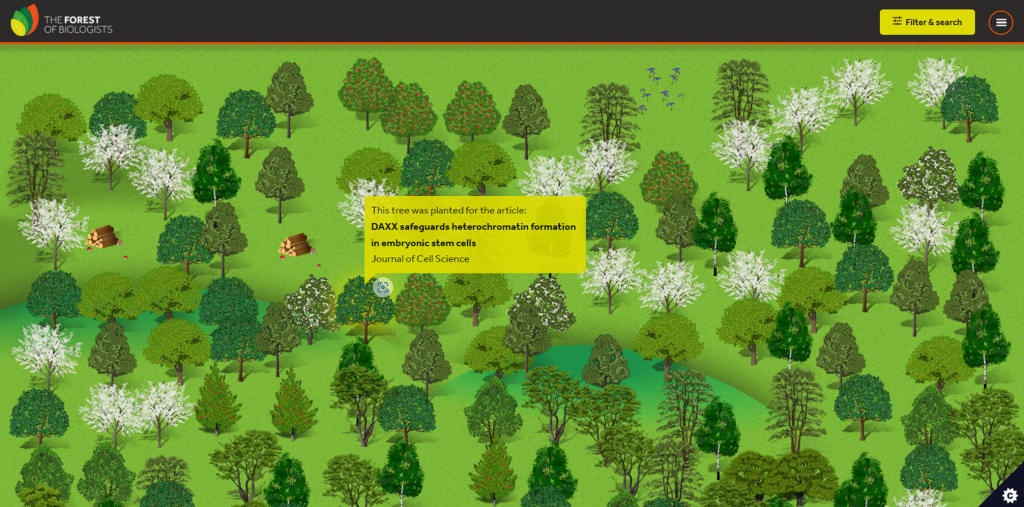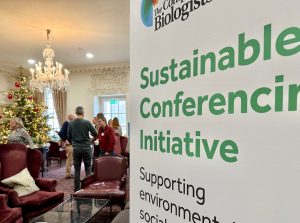

11 July 2024
It can be problematic to perfectly blend social, environmental and financial goals when organising an academic event, but we think that Chrissy Hammond (University of Bristol) and her co-organisers Lizzie Lawrence, Joanna Moss, Nikki Stevenson and Rabia Sevil rose to the challenge at The Dynamic matrix: mechanics, ageing and repair Conference, a British Society for Matrix Biology (BSMB) meeting. We were delighted to support this event from our Fund for Innovations in Sustainable Conferencing and Scientific Meeting Grants, and we are keen to continue supporting events like this in the future.
 We are very grateful to Chrissy for welcoming us at this event. We had the opportunity to talk with the main stakeholders involved in the planning process and we would like to share with you some of the good practices they implemented whilst organising a green meeting. …
We are very grateful to Chrissy for welcoming us at this event. We had the opportunity to talk with the main stakeholders involved in the planning process and we would like to share with you some of the good practices they implemented whilst organising a green meeting. …
11 June 2024
Sustainable practices are often seen as actions that minimise environmental impact. According to the Sustainable Development Goals (SDGs) proposed by the UN, sustainable practices include themes such as environmental protection, the fight against poverty, inclusion, and collaboration.
While many of our blogs explore tips on how to minimise the environmental impact of events, in this blog we will talk about the social aspects of sustainability and how to approach them when organising a conference. …
7 March 2024
 We are delighted to see that the biology community has been showing their natural creativity by experimenting with different conference models (Lowell et al. 2022) and we have been very pleased to support some of these experiments with funding through our Sustainable Conferencing Grants.
We are delighted to see that the biology community has been showing their natural creativity by experimenting with different conference models (Lowell et al. 2022) and we have been very pleased to support some of these experiments with funding through our Sustainable Conferencing Grants.
18 January 2024
Our Publisher Claire Moulton recently visited the two Woodland Trust UK sites where we are planting new native trees for published Research and Review papers and protecting ancient woodland on behalf of our peer reviewers.
28 November 2023

Accommodation and catering often has the second highest environmental impact of an event after transportation 1 2 3 and so choosing a sustainable venue for your event can make a big difference in your environmental impact. Venues are increasingly transparent about their sustainability measures and commitments, and information can be found on their website or by speaking with staff.
So what are the key factors to consider when looking for a sustainable venue?
28 June 2024

We are very proud that The Forest of Biologists has been shortlisted for the ALPSP Impact Award 2024. This is a great recognition for a project that we have thoroughly enjoyed launching and that we feel makes a true impact to both the scientific community and the natural environment.
11 April 2024

At any event food is an integral part of your attendees’ experience. However, managing the impact of food choices is not straightforward in terms of sustainability. In this blog, we look at some more tips to help make the menus at your upcoming events more sustainable. In case you missed it, check out part 1 of this guide. …
29 January 2024
As we all continue to manage the challenges of global warming and biodiversity loss, it is important that the events industry embraces new and emerging technologies to play our part in contributing in the fight against climate change.
Last year, The Company of Biologists reinforced our commitment to making our Workshops more sustainable. We are now looking forward to our 2024 Workshop programme and will continue to implement all we have learned last year, as well as explore new ideas that can help mitigate the impact of our events. …
20 December 2023

It is known that some organised events can create up to 2400 metric tonnes of CO2/eq, which has a significant impact in accelerating global warming. Every step taken to decrease the carbon impact of the event industry counts in the fight against climate change, and this is something which The Company of Biologists feels strongly about.
This year, we reinforced our commitment to decrease the carbon footprint of our scientific Workshops, working hard to implement new sustainable strategies during the organisation and implementation of our events.
We are excited to share with you some of our achievements from 2023 in tackling the carbon footprint of multiple aspects of our Workshops: …
24 October 2023
Travelling represents the largest carbon impact of an event. It can count for up to 56% of the whole event’s carbon footprint 1, and the impact is significantly higher when international participants use flights to reach the event.
With this in mind, we were delighted to award a Sustainable Conferencing Grant to Dr Serena Stanga who came with a solution that combined technology with alternative travelling, leading to a reduction in travel carbon footprint for her symposium “In pursuit of healthy brain aging: unveiling the biology of novel age-related mechanisms leading to dementia”, which was part of the 20th National Congress of the Italian Society for Neuroscience (SINS) 2. …
You must be logged in to post a comment.